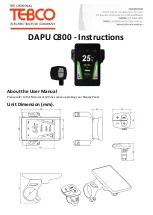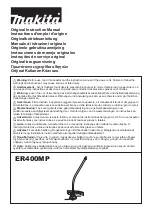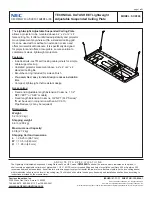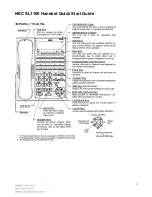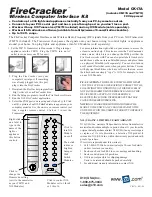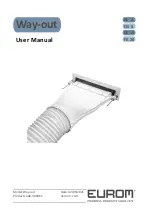
7 - MAINTENANCE
General specification - Biodiesel fuels
Biodiesel fuel usage in CASE CONSTRUC-
TION products
Introduction to biodiesel fuel
Fatty Acid Methyl Ester (FAME) biodiesel fuel, called
biodiesel fuel in the following paragraphs, consists of a
family of fuels derived from vegetable oils that producers
treat with methyl esters.
There are two main biodiesel fuel types:
Rapeseed
Methyl Ester (RME) and Soybean Methyl Ester (SME).
RME is a blend of rapeseed and sunflower methyl es-
ter. RME is the preferred crop in Europe. SME is the
preferred crop in the United States.
Biodiesel fuel is a renewable alternative fuel source. Its
use and development is promoted worldwide, especially
in Europe and in the United States.
NOTICE:
It is imperative that you check with your CASE
CONSTRUCTION dealer to learn which biodiesel fuel
blend CASE CONSTRUCTION approves for use in your
engine. Be aware that the use of biodiesel fuel blends
that do not comply with
ASTM D6751
or
EN14214
could
cause severe damage to the engine and fuel system
of your machine.
The use of non-approved biodiesel
fuel blends may void CASE CONSTRUCTION Warranty
coverage.
Biodiesel fuel blends use the following labels to indicate
the percentage of biodiesel fuel in the blend:
• B5: indicates the blend of
5 %
biodiesel fuel and
95 %
diesel fuel.
• B7: indicates the blend of
7 %
biodiesel fuel and
93 %
diesel fuel.
• B20: indicates the blend of
20 %
biodiesel fuel and
80 %
diesel fuel.
• B100: indicates
100 %
biodiesel fuel.
Biodiesel fuel has several positive features in comparison
with diesel fuel:
• Biodiesel fuel adds lubricity to the fuel. Additional lu-
bricity is beneficial in many circumstances, particularly
as fuels contain less sulfur and aromatics.
• Biodiesel fuel has a greater cetane number and burns
more cleanly.
• Biodiesel fuel produces less particulate matter and re-
duces smoke emissions.
• Biodiesel fuel is fully biodegradable and non-toxic.
Specifications for diesel fuel and biodiesel
fuel
The following standards apply to diesel fuel
specifications:
•
ASTM D975
, Standard Specification for Diesel Fuel
Oils. (15 ppm sulfur maximum.)
•
EN 590
-Automotive fuels - Diesel - Requirements and
test methods. (
10 ppm
sulfur maximum.)
The following standards apply to biodiesel fuel blends:
• United States Diesel Fuel Specification
ASTM D6751
allows up to
5 %
biodiesel since 2009. United States
fuel suppliers are allowed to use up to
5 %
biodiesel
fuel (B5) to supply the network.
• United States Biodiesel Fuel Specification
ASTM
D7467
provides specifications for diesel and biodiesel
blends from B5 to B20.
• European Diesel Fuel Specification
EN 590
allows up to
7 %
biodiesel since 2009. European fuel suppliers are
allowed to use up to
7 %
biodiesel fuel (B7) to supply
the network.
The following standards apply to pure biodiesel fuel
(B100):
•
ASTM D6751
- Standard specification for biodiesel fuel
blend stock (B100) for middle distillate fuels.
NOTE:
ASTM updated
ASTM D6751
to improve the
quality of biodiesel in the market place.
•
EN14214
- Liquid petroleum products - Fatty acid
methyl esters (FAME) for use in diesel engines and
heating applications - Requirements and test methods
Before producers can convert raw oil into usable biodiesel
fuel, it must undergo transesterification to remove glyc-
erides. During the transesterification process, the oil re-
acts with an alcohol to separate the glycerin from the fat or
vegetable oil. This process leaves behind two products:
methyl ester (the chemical name for biodiesel) and glyc-
erin (a byproduct usually sold for use in soaps or other
products).
NOTICE:
CASE CONSTRUCTION only approves trans-
esterified biodiesel fuel blends that comply with
ASTM
D6751
or
EN14214
.
NOTICE:
Non-transesterified fuels made from rapeseed
oil or similar high oil content crops include cold-pressed
biodiesel, cold-pressed oil, Straight Vegetable Oil (SVO),
or more generally unrefined vegetable oils used as
motor fuel. Because these types of fuel are not trans-
esterified, they do not fulfil the requirements of
ASTM
D6751
or
EN14214
.
There is no recognized quality
standard available for these types of fuel; therefore,
CASE CONSTRUCTION DOES NOT APPROVE the
use of cold-pressed biodiesel, cold-pressed oil, Straight
Vegetable Oil (SVO), or more generally unrefined veg-
etable oils as motor fuel at any blend in any CASE
CONSTRUCTION product.
NOTICE:
CASE CONSTRUCTION will discontinue War-
ranty coverage of any engine equipment and fuel injection
7-5
Summary of Contents for 580ST
Page 8: ......
Page 24: ...1 GENERAL INFORMATION 1 16 ...
Page 49: ...2 SAFETY INFORMATION Extend telescopic dipper If fitted MOLI12LBB0092AA 24 2 25 ...
Page 101: ...3 CONTROLS AND INSTRUMENTS Setup menu LEIL12TLB00006I 1 3 39 ...
Page 144: ...3 CONTROLS AND INSTRUMENTS 3 82 ...
Page 164: ...4 OPERATING INSTRUCTIONS 4 20 ...
Page 166: ...5 TRANSPORT OPERATIONS RAIL14TLB1181GA 1 5 2 ...
Page 222: ...6 WORKING OPERATIONS 6 44 ...
Page 247: ...7 MAINTENANCE Fuel tank capacity 145 L 38 30 US gal 2WS 124 L 32 76 US gal 4WS 7 25 ...
Page 347: ...7 MAINTENANCE Fuses and relays Powershift cab 2WS MOLI12LBB0491CA 7 7 125 ...
Page 349: ...7 MAINTENANCE Fuses and relays Powershift cab 4WS MOLI12LBB0492CA 8 7 127 ...
Page 390: ...8 TROUBLESHOOTING 8 28 ...
Page 418: ...9 SPECIFICATIONS 4WS LEEN11T0039FA 2 9 28 ...
Page 420: ...9 SPECIFICATIONS 2WS 590ST LEEN11T0041FA 5 4WS 695ST LEEN11T0042FA 6 9 30 ...
Page 433: ......































